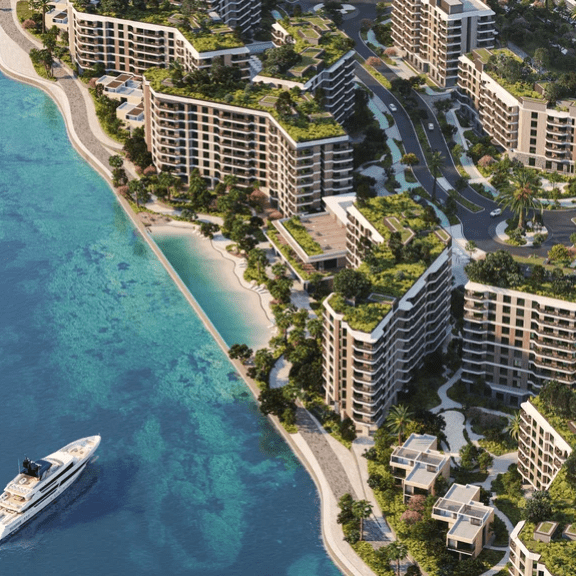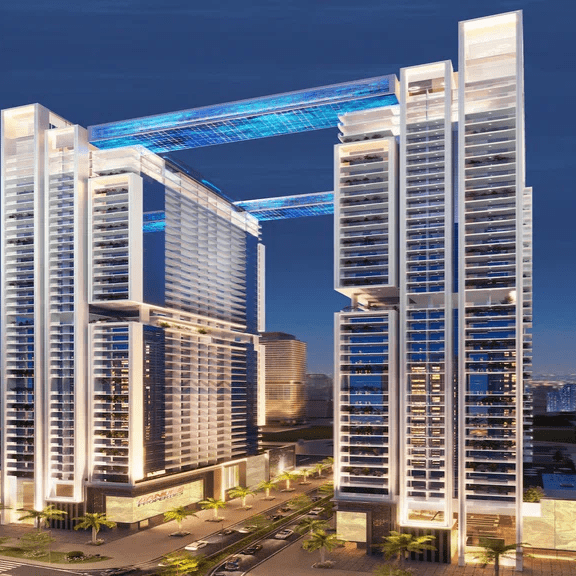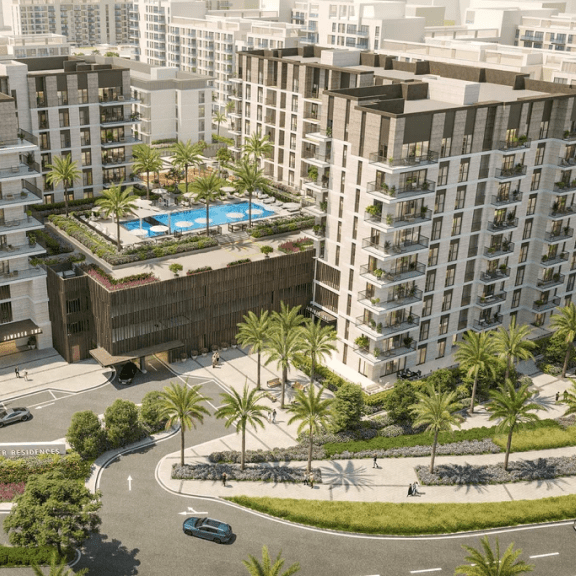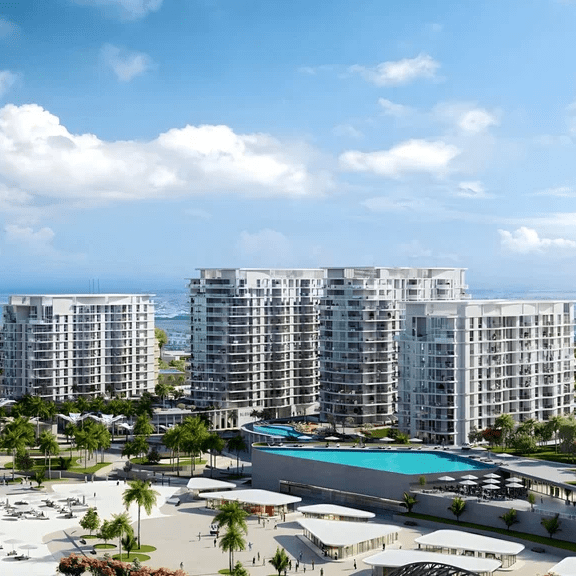If you're a non-citizen residing in the UAE, you're not subject to income tax, profit tax, inheritance tax, luxury tax, and various other taxes. This favorable tax environment is a key attraction for expatriates in the Emirates. However, it's essential to be aware of certain tax intricacies and understand that there are additional fees associated with property ownership. In this article, we will delve into the taxes and fees imposed on property owners in the UAE.
There is no annual property tax for houses, apartments, and commercial real estate in the UAE. Additionally, residential property transactions are not subject to value-added tax (VAT).
But that doesn’t mean there won’t be fees you’ll have to pay as a property owner in the UAE. In fact, renters pay them as well as owners.
Let’s dive into the details.
- Fees Paid when Purchasing Land or Residential Real Estate
- Calculating the Total Fees for a Hypothetical Purchase
- Property Upkeep Costs
- Rental Tax for Residential Properties
- Residential and Commercial Real Estate
- Who Pays VAT?
- Delivery and Refunds
- Land and Charity
- Inheritance and Property Donation Fees
- Corporate Tax
Fees Paid when Purchasing Land or Residential Real Estate
Before acquiring property in the UAE, the buyer must be aware of the following fees:
- Land Department fee: 4% of the property value in Dubai and 2% in Abu Dhabi.
- Certification fee: AED 430 ($117) for land, AED 580 ($158) for apartments and houses.
- Registration fee: AED 2,000 ($544) for properties valued at AED 500,000 or less, AED 4,000 ($1,088) for properties with a higher value.
- The registration fee varies for properties purchased with a mortgage. In such cases, it is 0.25% of the confirmed mortgage in Dubai and 0.1% of the total mortgage in Abu Dhabi.
- Administrative fee: After the transaction is completed, you will need to contact your local court to obtain a document confirming your ownership rights. In Dubai, this process costs AED 260 ($70) and takes three days to complete, while in Abu Dhabi, it is AED 1,000 ($272).
- In addition to the official fees and duties, property sales also involve:
- Real estate agency commission: Typically 2% of the property value.
- No Objection Certificate (NOC): The cost ranges from AED 1,000 to AED 5,000 ($272 to $1,361) and is applicable to completed and operational buildings.
- Builder fee: AED 5,000 ($1,361) for apartments or commercial spaces purchased in buildings that are still under construction.
New buildings in the UAE
Calculating the Total Fees for a Hypothetical Purchase
Let's consider the purchase of a one-bedroom, two-bath apartment in Concorde Tower (Jumeirah Lake Towers, or JLT) with a price of AED 1,150,000 ($313,100). Assuming the buyer has the full amount without needing a mortgage, here's a breakdown of the expected expenses:
- Land Department fee: 4% of the total property value - AED 46,000 ($12,500)
- Certification fee: AED 580 ($158)
- Registration fee: AED 4,000 ($1,088)
- Administrative fee: AED 260 ($70)
- Real estate agency commission: 2% of the total property value - AED 23,000 ($6,250)
- No Objection Certificate (NOC): Approximately AED 4,000 ($1,088)
The total fees for this transaction amount to AED 77,840 ($21,195).
If the buyer requires a mortgage, the registration fee will be AED 2,875 instead of AED 4,000, resulting in a total of AED 76,715 ($20,890).
Photo by katemangostar (Freepik)
Property Upkeep Costs
As previously mentioned, the UAE does not impose federal or municipal property taxes. Nonetheless, property owners are responsible for property maintenance. This includes tasks such as waste disposal, lawn care, monitoring utility meters, and ensuring the cleanliness of common areas such as playgrounds, gyms, and pools. Additionally, property owners should allocate funds for routine maintenance and major repairs.
If you own a property in a serviced neighborhood, whether it's an apartment, commercial space, or a house, you can anticipate annual fees averaging AED 3-30 ($0.82-8.2) per square foot. It's important to note that floor space in the UAE is typically measured in square feet, with one square foot equivalent to 0.093 square meters. Therefore, property rates are often calculated based on square footage.
The property owner, typically the builder of the development, determines the payment amount based on various factors, including the property's square footage, the number of floors, technical amenities, and the project's infrastructure.
Let's revisit the one-bedroom apartment in JLT that we used to calculate the fees.
Service payments amount to AED 12.03 ($3.58) per square foot per year, and the apartment has a total area of 1432 square feet (133 m²). This means that the annual payment will be AED 17,227 ($4690) or AED 1435 ($390) per month. Please note that this amount does not include electricity or water costs.
It's important to consider that if an individual residing in or renting a commercial space incurs significantly higher water and electricity bills compared to the neighborhood average, their service fees may also increase accordingly. This adjustment reflects the additional strain they are placing on the building's utility systems.
Beach Isle (Housearch)
Rental Tax for Residential Properties
Municipalities in the UAE impose a rental tax on residential properties, typically paid by the tenant. The tax amount is determined based on the annual rent, and the rates vary depending on the emirate.
In Dubai, all residential renters are required to pay 5% of their annual rent as a rental tax. In Abu Dhabi, the rate is 3%, and it is applicable only to expatriates. In Sharjah, the rental tax rate is 2%.
The rental tax for commercial real estate renters is 10% of annual rent everywhere.
The total is divided by twelve and included in the monthly utilities bill.
Azizi Samia Residence (Housearch)
Residential and Commercial Real Estate
We’re going to talk about VAT for residential and commercial properties, but we first need to define our terms.
According to Emirati law, residential real estate must be connected to land. Therefore, motorhomes, trailers, and tents are not considered part of this category.
Another crucial factor to consider is zoning. Property designations are defined and established in the documentation before construction commences.
Commercial real estate is typically defined by a process of elimination. It encompasses all properties that do not fall under any of the following categories:
- Buildings planned and zoned for residential use
- Buildings designated for use by charitable organizations conducting charitable activities
- Vacant land
In the case of multifunctional buildings that include office, retail, or entertainment zones alongside residential sections, the tax rate for the residential properties and the cost of utilities (such as water and electricity) are typically maintained at the same level as regular residential buildings.
Who Pays VAT?
The situation regarding VAT for real estate is more complex than it may appear at first glance. In essence, the rule seems straightforward: a 5% VAT rate applies to all transactions involving commercial buildings and spaces, while residential buildings and apartments are exempt from VAT.
It's important to keep in mind that the UAE has two VAT statuses: one involves the exemption from paying VAT, and the other entails a 0% VAT rate.
Who pays VAT and has to register as the payer?
- Investors with annual earnings of more than AED 375,000
- Landlords without UAE residency
- Residential property owners who are entrepreneurs with investments in the UAE besides their housing
In such cases, the VAT rate for residential real estate remains at 0% unless there are changes made to tax legislation by the government.
Everyone else is exempt from paying VAT, and this exemption will not change even if the rate is increased.
Photo by rawpixel.com (Freepik)
Delivery and Refunds
All legal construction in the UAE is incentivized by the government. The rule applies equally to individuals and legal entities: if you buy land and build a house on it, you have six months from the moment you receive the completion certificate to apply for a refund of the VAT you paid for building materials and services.
For residential builders, all of whom are VAT payers, there's a rule for first and subsequent deliveries. Within three years of completing construction, the first sale or rental of apartments and houses is subject to a 0% VAT rate. The objective is to help builders recoup the taxes they paid for the goods and services (transportation, for example) required during construction. It's important to remember, however, that the government could raise the VAT rate for transactions currently taxed at 0% at its discretion.
Subsequent transactions for residential property are not subject to VAT, whether they are completed during that three-year period or not.
With that said, builders charge their own fee when delivering apartments and homes to their new owners, and this fee is subject to VAT in full. Taxes are also applied to utilities and service fees.
Land and Charity
Tax policy for land plots refers to them as vacant or commercial. Arab lawyers often use the term "bare land" to refer to land with or without vegetation but strictly without buildings, whether complete or incomplete. Ongoing or completed engineering work is also not present on these plots. For land plots that fall into this category, VAT is not applied.
If a plot has any of the above, it’s considered commercial. Sale and rental transactions are charged the same federally consistent 5% VAT applied to all commercial property.
The UAE gives charitable buildings their own category. They’re defined as a building or part of a building designated for use by a charitable organization or exclusively for charitable activity.
Transactions in this category are subject to the following VAT rates:
- 0% for the initial sale or rental (first delivery)
- The usual 5% for all subsequent transactions
Inheritance and Property Donation Fees
Federal Emirati law does not include taxes on property that is inherited or donated. On the other hand, both types of transactions are considered equivalent to sales. The person inheriting the property or receiving it as a donation therefore pays a registration fee: 4% of the value of their new property. They’re also charged an administrative fee for the new deed.
Residential complex Peninsula Four (Housearch)
Corporate Tax
On June 1, 2023, the UAE will introduce a corporate tax. Despite the name, it also applies to individuals when their private investments can be seen as a business. That includes non-Emiratis purchasing property as an income stream.
The tax rates will be:
- 0% for income up to AED 375,000 ($102,000) per year
- 9% for income starting at AED 375,000 per year
Here’s how that would look for a tax period (calendar year) where you earned AED 1,000,000:
1,000,000 - AED 375,000 = 625,000 х 9% = AED 56,250
The total payable tax can be reduced with tax incentives.
In a Nutshell
Tax legislation in the UAE is firmly on the side of entrepreneurs and investors, including in real estate. Buying and selling property is simple and profitable. But that doesn’t mean you can forget about paying the additional fees and handling your paperwork carefully.
Cover photo: freepik




